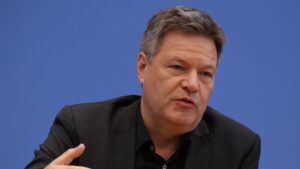Trump’s Tariffs: Germany’s Response and the Future of European Trade
As tensions between the United States and Europe intensify over trade policies, a recent press conference by Robert Habeck, Germany’s acting economy minister, has brought these issues to the forefront of international attention. Following U.S. President Donald Trump’s announcement of new tariffs on European imports, Habeck boldly predicted that Trump would "buckle under pressure" if Europe united in its response. A notable figure within the German Greens Party, Habeck’s insights reflect the urgent need for a coordinated European stance against aggressive tariff strategies.
The Impact of Trump’s Tariffs on Germany
The U.S. has imposed a 20% tariff on imports from the European Union, which marks a significant escalation in trade tensions. Germany, being heavily reliant on trade—especially with the U.S.—is poised to feel the effects deeply. With trade turnover between the two nations exceeding 252.8 billion euros in 2024, these tariffs could jeopardize not just immediate economic relationships but also long-term growth prospects for German businesses.
Outgoing Chancellor Olaf Scholz voiced his concerns, labeling the recent tariff impositions as "fundamentally wrong" and describing them as poorly thought-out decisions that could lead to suffering for the global economy. Such statements highlight the precarious balance that Germany must maintain in its economic engagements, especially as it navigates its most critical trade relationships.
A Call for Unity and Strategic Independence
Habeck’s remarks at the press conference emphasized the necessity for Europe to band together in presenting a united front against such tariff policies. He argued that the key to success lies not only in resisting pressure but also in leveraging it strategically. "We just can’t rely on everyone only being friendly to us anymore," Habeck asserted, referencing the damaging lessons learned from Germany’s economic dependence on Russian energy during the Ukraine crisis.
In his vision for Europe’s economic future, Habeck highlighted the importance of making strategic investments in technology, infrastructure, and innovation. He specifically mentioned the need to bolster cloud infrastructure and expand capabilities in artificial intelligence and space technologies. These investments can pave the way for greater economic independence, lowering Europe’s vulnerability to external pressures.
What Lies Ahead: A Game of Economic Chess
Looking ahead, the stakes are high. The economic ramifications of Trump’s tariffs could reshape trade dynamics not just for Germany, but for the entire EU. As Trump’s tariffs potentially disrupt exports and market stability, the DAX index has already shown signs of strain, falling by approximately 1.6%. Meanwhile, German government bonds have seen yields plummet, indicating investor unease amidst rising tensions.
In light of these developments, European Commission President Ursula von der Leyen has stressed the importance of countermeasures, stating that the EU is prepared to respond to the tariffs if negotiations do not yield favorable results. However, she also called for dialogue, suggesting that it is not too late to switch from confrontation to negotiation.
Conclusion: The Path Forward for Europe
As the situation unfolds, the European response will be critical in determining not only its economic resilience but also its future standing on the global stage. At Extreme Investor Network, we understand that the current trade dynamics necessitate a keen eye on geopolitical strategies, investment opportunities, and market responses.
The interplay of tariffs, trade policies, and diplomatic negotiations offers a complex landscape for investors. By continuing to provide up-to-date economic analyses and insights, we position our readers to navigate this volatile environment effectively. Keep following our updates as we delve deeper into the impacts of these tariffs and the broader implications for global trade and investment. Together, we can uncover opportunities amidst uncertainty and harness our collective potential in this dynamic economic climate.

